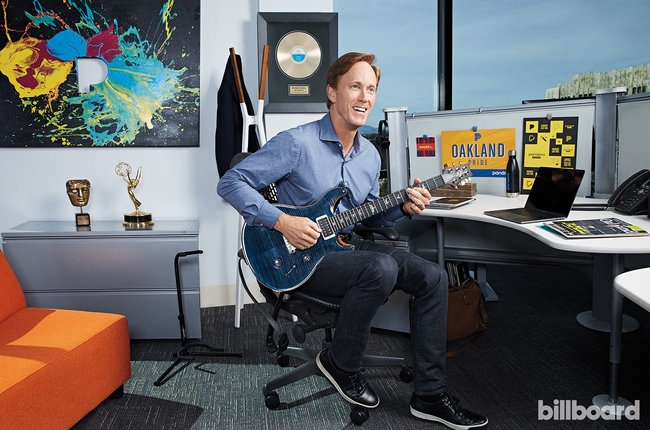Pandora just entered the on-demand music subscription business, but the Oakland, Calif.-based company has been streaming songs for almost as long as Apple's iTunes Store has been selling them. The company's new president/CEO, Roger Lynch, goes back almost as far: He worked on Broadcast.com's 1998 initial public offering as a banker and spent the last five years as chief executive of Sling TV, an "over-the-top" internet subscription TV service owned by Dish Networks.
That means Lynch, 54, is used to negotiating with media companies concerned that online business models will erode their margins. "I keep finding myself in roles where technology is meeting media in interesting ways," says Lynch as he prepares to move from Denver to San Francisco. "This is an industry in transition. I'm attracted to that."
Pandora is in a transition of its own. As Spotify and Apple Music make on-demand streaming mainstream, Pandora's online radio has been losing some luster, as well as some listeners. The company now offers its ad-supported free radio service, a commercial-free Pandora Plus plan and, since March, the Pandora Premium on-demand product. In July, the company announced that it had 76 million users and 4.9 million total subscribers, but only 390,000 for Pandora Premium.
In June, amid continuing financial losses, Pandora sold a 19 percent stake in the company to SiriusXM for $480 million. Founder Tim Westergren resigned as chief executive, and the company sold Ticketfly and pulled out of Australia and New Zealand, the only other countries where it had operated. "They were a bit late to the on-demand subscription model," says Lynch. "It's a company we know is facing challenges, and I like that."
Pandora also appeals to Lynch as a music fan who started playing guitar at 10. He performs with other executives and professional musicians in The Merger, a classic-rock band that often raises money for charity. "I'm a businessman first and a musician second," he says, "but I'm excited to apply what I've learned to a category I'm passionate about."
Pandora has had an up-and-down relationship with the music business: It was a "frenemy" that used a government-established online radio license; then a lobbying opponent; now a partner. What's your approach going to be?
My approach is to partner with rights-holders. That doesn't mean you don't have difficult negotiations, but the underlying principle is, "Let's work together to maximize profits for both of our businesses by doing innovative things."
What do you think of Pandora as a product?
I've had a Pandora account since I moved back from Europe in 2008. At the time, I was used to the on-demand experience of iTunes, and what impressed me about Pandora was how it would continue to surprise me with music I was interested in. When Pandora approached me, I really didn't have an appreciation for its size. It has more users in the U.S. than Spotify.
What did you learn running Sling TV that might apply at Pandora?
I've run three subscription businesses, but Sling helped me hone my skills in how to grow subscriptions and get a return on promotion investment in digital, mobile and social marketing. There will be a focus on direct-to-consumer marketing.
Like Pandora, Dish has had a bumpy relationship with media companies.
In the case of Sling TV, we thought we would launch three years before we did; the holdup was convincing rights-holders. It was frustrating, but we changed the industry. Rights-holders can be reluctant to change because they like their existing business models. But in any direct-to-consumer business, you have to start with a focus on the consumer and develop a business model around that.
SiriusXM is now a major investor. Will that affect your commitment to the on-demand subscription model?
All three tiers of the service are important. If you could get everyone in America to subscribe, wouldn't the world be great? But that's not the case: There's a segment of the audience that will pay $10 a month, a segment that will pay $5 and a segment that won't pay at all. Pandora has a significant share of the audio ad marketplace, and we'll focus on building tech to bring more value to our advertisers.
SiriusXM tends to negotiate very aggressively with rights-holders. How closely will you be working with them?
They have three out of nine board seats and 19 percent of the company. They'll be very important, but they won't control the business. My approach will be to look for synergies that will benefit both companies -- and the important part of that is both.
Speaking of which, how do you see Pandora's future in the car?
Pandora is already tapping into that; we've launched in 190 different vehicle models. [The Pandora service is integrated into the dashboard.] You then have to think about traditional radio, which is an $18 billion advertising market. That's a significant growth opportunity.
Pandora is already competing with Apple Music, Spotify and Amazon. How many music-streaming services do you think there's room for?
Music-streaming services don't benefit from network effects [when a service gains value with more users] as much as Facebook and eBay. If you're only going after the on-demand subscription business, that's a tough place to be because of the number of competitors. You have to be concerned about Apple and Amazon because of their resources and built-in audience. But never underestimate a focused competitor.
Is your band's music on Pandora?
No. But when I went to interview with the board, I think they liked the fact that I'm a musician. I never thought that playing guitar would get me a job, but I had the feeling it was a factor.
If The Merger was in a battle of the bands with JD & The Straight Shot, Madison Square Garden Co. executive chairman James Dolan's band, who would win?
It's not even close -- we'd kick their ass.
This article originally appeared in the Oct. 7 issue of Billboard.








